Abstract
This study demonstrates that hydrogen enrichment in lean-burn spark-ignition engines can simultaneously improve three key performance metrics, thermal efficiency, combustion stability, and nitrogen oxide emissions, without requiring modifications to the engine hardware or ignition timing. This finding offers a novel control approach to a well-documented trade-off in existing research, where typically only two of these factors are improved at the expense of the third. Unlike previous studies, the present work achieves simultaneous improvement of all three metrics without hardware modification or ignition timing adjustment, relying solely on the optimization of the air–fuel equivalence ratio . Experiments were conducted on a six-cylinder engine for combined heat and power application, fueled with hydrogen–natural gas blends containing up to 30% hydrogen by volume. By optimizing only the air–fuel equivalence ratio, it was possible to extend the lean-burn limit from to , reduce nitrogen oxide emissions by up to 70%, enhance thermal efficiency by up to 2.2 percentage points, and significantly improve combustion stability, reducing cycle-by-cycle variationsfrom 2.1% to 0.7%. A defined window was identified in which all three key performance indicators simultaneously meet or exceed the natural gas baseline. Within this window, balanced improvements in nitrogen oxide emissions, efficiency, and stability are achievable, although the individual maxima occur at different operating points. Cylinder pressure analysis confirmed that combustion dynamics can be realigned with original equipment manufacturer characteristics via mixture leaning alone, mitigating hydrogen-induced pressure increases to just 11% above the natural gas baseline. These results position hydrogen as a performance booster for natural gas engines in stationary applications, enabling cleaner, more efficient, and smoother operation without added system complexity. The key result is the identification of a window that enables simultaneous optimization of nitrogen oxide emissions, efficiency, and combustion stability using only mixture control.
1. Introduction
Hydrogen-enriched natural gas (
) has emerged as a promising transitional fuel for decarbonizing stationary power generation, particularly in combined heat and power (CHP) systems. Blending renewable hydrogen into the existing natural gas (NG) infrastructure can leverage current assets while reducing emissions at the point of use [1,2]. Furthermore,
aligns with broader sectoral efforts to integrate low-carbon fuels into the heating and power mix, facilitating a gradual shift toward fully renewable energy systems [3].
Hydrogen’s appeal in spark-ignition engines stems from its unique combustion properties. Its high laminar flame speed and wide flammability limits support stable combustion under ultra-lean conditions, enabling extended lean operation and improved thermal efficiency [4,5]. Its low ignition energy and high diffusivity further enhance spark-ignition performance by reducing cycle-to-cycle variation and extending stable operation [6]. Moreover, the absence of carbon in inherently eliminates direct formation, an attractive feature for reducing greenhouse gas emissions in decentralized power plants [1].
The blending of natural gas with hydrogen at concentrations of up to approximately 30 vol% is widely recognized as technically feasible and has been associated with favorable effects on engine performance and emissions. Extensive experimental and numerical studies have consistently demonstrated that hydrogen enrichment within this range can enhance combustion efficiency, reduce regulated emissions, and modify heat transfer characteristics within the combustion chamber. Stable operation has been achieved in both port fuel injection and direct injection engine configurations at hydrogen levels up to 30 vol%, with some concepts allowing even higher fractions. These findings are comprehensively summarized in several review articles [7,8,9,10,11].
However, most studies focus on automotive engines under transient loads or require (hardware) modifications such as altered ignition timing or intake enhancements. Research on multi-cylinder stationary CHP units remains scarce. Critically, the literature reveals a persistent trade-off: hydrogen enrichment can improve one or two key performance indicators (KPIs), thermal efficiency (), combustion stability (indicated by the coefficient of variation of the indicated mean effective pressure ), or nitrogen oxide ) emissions, but not all three simultaneously without hardware or timing changes [10,11]. Experimental campaigns report lean-limit extension and reduction at the cost of increased [4,12] or enhanced stability and efficiency accompanied by elevated formation, which has to be mitigated by retarded ignition timing [6,12].
Comprehensive reviews affirm this optimization dilemma as a central barrier to deploying in existing CHP fleets [9]. In particular, simulation-based multi-objective studies require hardware or ignition changes, introducing cost and complexity that limit retrofit viability.
To date, no study has provided an experimental demonstration of simultaneous reduction, efficiency gain, and stability improvement on a commercially available, multi-cylinder CHP engine without hardware or ignition-timing modifications. Neither has the potential of (air–fuel equivalence ratio) as the sole control parameter for multi-objective optimization been systematically assessed at hydrogen shares up to 30 vol% under steady-state stationary conditions.
The present work fills this gap. Using a six-cylinder MAN E 0836 LE 202 lean-burn spark-ignition CHP engine (E 0836 LE 202) from manufacturer MAN (Munich, Germany), we show that, by adjusting only , hydrogen enrichment up to 30 vol% can simultaneously expand the lean-burn limit, reduce emissions, enhance thermal efficiency, and improve combustion stability, all while retaining OEM-compliant engine hardware and spark timing. The experimentally identified -window for balanced KPI optimization provides a robust, low-complexity retrofit strategy for decarbonizing existing gas engines. This study thus bridges the divide between simulation-based proposals and practical, deployable solutions for in stationary energy systems.
2. Materials and Methods
2.1. Engine and Test Bench
All experiments were performed on a commercially available six-cylinder lean-burn spark-ignition engine (MAN, Munich, Germany; model: E 0836 LE 202; the key engine specifications are summarized in Table 1) designed for stationary combined heat and power applications. The engine is turbocharged, liquid-cooled, and operated at a constant speed of 1500 rpm. Engine speed is controlled by a WT-470 eddy-current dynamometer from HORIBA (Kyoto, Japan), operated in closed-loop mode via the x-actD test bench controller. The brake absorbs engine power and converts it into heat, which is dissipated using a closed-loop water cooling system. The engine torque load was adjusted via a throttle valve (instead of generator load variation), allowing fine resolution of the engine’s lambda. The test bench is configured to precisely regulate both speed and torque, with a control accuracy of rpm and torque measurement accuracy within of full scale, as specified by the integrated strain gauge-based torque transducer. The brake system includes self-monitoring features, including bearing temperature surveillance and cooling flow protection. Ignition was controlled using a MIC3 ignition system from Motortech (Celle, Germany), operating with original equipment manufacturer (OEM)-defined spark timing fixed at 17°CA bTDC for all tests. The ignition system includes robust ignition coils and capacitive discharge for consistent spark energy. Charge air was cooled to a constant temperature of () °C using a closed water circuit with PID-regulated thermal control. Coolant and oil temperatures were maintained within °C of their setpoints (85 °C and 90 °C, respectively). To mitigate the risk of excessive cylinder pressure associated with hydrogen enrichment, the power output was reduced from the nominal 110 kW to 60 kW.

Table 1.
Engine details and OEM settings for six-cylinder MAN E 0836 LE 202 lean-burn spark-ignition engine.
Engine control, data acquisition, and real-time monitoring were implemented using a custom LabVIEW-based system, which records each sensor value at 1 Hz, independent of the sensor’s individuals sampling frequency. Cylinder pressure data was collected by an independent system, using KISTLER 6125B11 pressure transducers and a KISTLER 2614 A1 crank-angle encoder set with a resolution of 0.1°CA.
KPI Measurement and Calculation
Combustion stability was quantified via the coefficient of variation of the indicated mean effective pressure, which is defined as the ratio of the standard deviation to the mean of the measured IMEP:
emissions were measured using a calibrated MRU Vario Plus industrial analyzer. Thermal efficiency was calculated based on the measured fuel gas mass flow and electrical power output. In-cylinder pressure traces were used to determine peak pressure, pressure-rise rates, and combustion phasing characteristics.
Thermal efficiency was calculated by the ratio of engine power output P measured by the eddy-current dynamometer, and the power input, calculated from NG and mass flow controller data.
2.2. Fuel Supply System and Gas Blends
The test bench setup integrates the fuel supply, air handling, and control systems into a single coordinated configuration designed for precise mixture control under stationary operating conditions.
Fueling was conducted using hydrogen from high-pressure gas cylinders (approx 200 bar, purity grade 3.0) and natural gas from the public grid. The hydrogen content was varied in 5 vol% increments from 0 to 30 vol%, resulting in seven distinct fuel blends, denoted as (see Table 2).

Table 2.
Fuel blends used in the experiments.
The NG composition, dominated by methane (~90%) and ethane (~5%), was provided by the local grid operator (N-ERGIE Netz GmbH, see Table 3), with a lower heating value of .

Table 3.
Composition of natural gas used in the experiments (monthly average, N-ERGIE Netz GmbH).
Hydrogen and natural gas were individually metered using calibrated mass flow controllers and sensors (: Bronkhorst IL-FLOW Select, accuracy ±0.5 % F.S.; and : ABB Sensyflow iG, accuracy ±0.8 % F.S.) that were individually calibrated for each gas, and blended upstream of the air mixer. Pressure regulators, check valves, and relief valves ensured safe and stable gas handling. The resulting premixed fuel gas was subsequently combined with combustion air, which was also measured with an MFC, via a Venturi-type mixer. The stepper motor-controlled mixer allowed for precise control. The mixing sequence is illustrated in Figure 1.
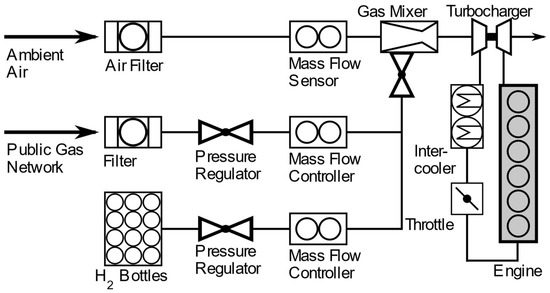
Figure 1.
Schematic drawing of the fuel supply system. The system includes separate mass flow controllers for NG and and a venturi gas mixer for air–fuel mixing.
Air mass flow was measured with a conventional airflow meter. The gas–air mixture was homogenized upstream of the turbocharger via a venturi mixer and subsequently cooled and throttled to match the desired load. The air–fuel equivalence ratio was actively controlled via a stepper motor that adjusted the mixer, and values were cross-validated using a broadband lambda sensor in the exhaust.
A schematic of the fuel and air supply system is shown in Figure 1.
Hydrogen safety was ensured through professional installation and certification of the gas infrastructure by licensed experts. The laboratory is equipped with a fixed gas detection system and multiple hydrogen-specific leak sensors.
2.3. Test Procedure
Each test run involved operating the engine at 1500 rpm and 60 kW power output using one of the defined blends. For each blend, the air–fuel equivalence ratio was progressively leaned from down to the individual lean limit, defined pragmatically as the point where stable operation was no longer possible, indicated by excessive cycle-to-cycle variation (). While this 3% threshold is not a fundamental limit, it proved to be a robust operational boundary in the present test setup and aligns with published ranges for acceptable combustion stability in lean-burn SI engines.
At each operating point, the engine was stabilized autonomously for a minimum of five minutes to ensure thermal and mechanical equilibrium. During this period, all relevant parameters were recorded at a sampling rate of 1 Hz, independently of the higher internal sampling rates of the individual sensors. From this interval, the final 100 s (n = 100 data points) were selected for analysis to ensure steady-state conditions.
The values reported for emissions, thermal efficiency, and combustion stability (indicated by ) are expressed as mean ± standard deviation over this 100-second window. This statistical treatment reflects the actual operational variability and is more representative than instrument-based uncertainty alone, as the observed fluctuations in the measured quantities exceed the expected sensor tolerances by at least an order of magnitude. Accordingly, the standard deviation serves as a conservative and realistic estimate of uncertainty, including the effects of combustion variability and process dynamics.
3. Experimental Results
This section presents the results of the experimental campaign, focusing on the individual and combined effects of hydrogen enrichment on nitrogen oxide emissions, combustion stability (indicated by ), and thermal efficiency. Following the reference case, each parameter is first analyzed separately. Subsequently, the intersection of the respective optimization ranges is used to identify operating conditions that allow simultaneous improvement of all three performance indicators. Finally, a cylinder-pressure analysis is employed to support the interpretation of the observed trends.
3.1. Reference Operating Point
As a baseline, the engine was operated with pure natural gas at and 17°CA bTDC ignition timing, both as per OEM recommendation for 60 kW output at 1500 rpm. Under these conditions, the following average values were recorded:
- ;
- ;
- .
These values serve as fixed reference thresholds for evaluating the effect of hydrogen addition in subsequent measurements.
3.2. Impact of Hydrogen Enrichment on Individual KPIs
Hydrogen enrichment of natural gas significantly influences key performance indicators such as nitrogen oxide emissions, combustion stability, and thermal efficiency. The following subsections examine these effects in isolation, as a foundation for the subsequent combined optimization.
While the individual effects of hydrogen on these parameters have been extensively investigated in the literature, most studies focus on optimizing only one or two KPIs, often at the expense of the third.
The present analysis of the individual KPIs under constant engine speed, ignition timing, and power output is therefore more than a repetition of existing findings. It establishes the boundaries and trade-offs that govern engine behavior when hydrogen is introduced, laying the groundwork for a novel demonstration that all three KPIs can be simultaneously optimized through a single control parameter: the air–fuel equivalence ratio . This integrative perspective has not been previously demonstrated in this form and is essential for practical implementation in stationary CHP applications.
3.2.1. Nitrogen Oxide () Emissions
Hydrogen enrichment has a twofold effect on emissions. On the one hand, the higher flame speed of hydrogen accelerates combustion and advances the phasing of peak pressure, which can locally increase flame temperatures and thus promote thermal formation via the extended Zeldovich mechanism. On the other hand, hydrogen’s excellent ignition properties enable stable operation at significantly higher air–fuel equivalence ratios, meaning the mixture can be leaned further, which in turn reduces the average combustion temperature and suppresses formation [5,11,13].
Our experimental data clearly reflect this duality. At a constant air–fuel equivalence ratio of , even small additions of hydrogen (≥5 vol%) cause a sharp rise in emissions. This is attributed to accelerated combustion and earlier phasing of peak pressure, as supported by the pressure traces in Section 3.4.
However, as increases, emissions decrease exponentially across all fuel blends. For the mixture, stable operation was possible up to , with values dropping by up to 70% compared to the reference point (see Figure 2). This highlights the key finding that the leaner operating range made accessible by hydrogen is the primary lever for reduction, not the hydrogen content per se.
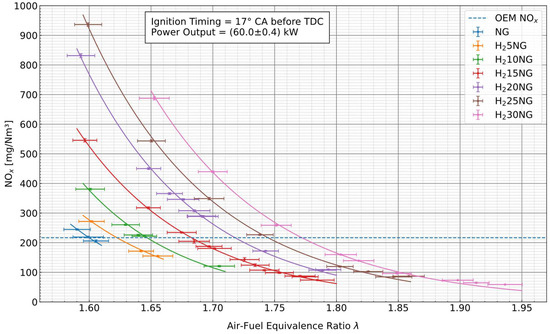
Figure 2.
Nitrogen oxide emissions versus air–fuel equivalence ratio for hydrogen-enriched fuel mixtures. Hydrogen-rich fuels enable leaner combustion and broaden the applicable range, giving flexibility for optimized engine control. The dashed horizontal line represents the baseline nitrogen oxide emissions under NG operation at .
The lean limit, defined in this work as the point beyond which exceeds 3%, increases linearly with hydrogen content. This shift expands the “optimization space” for . We derive an empirical model for the minimum required to undercut the reference threshold:
This empirical equation defines the minimum air–fuel equivalence ratio required to achieve emissions below the natural gas baseline for a given hydrogen concentration. It is essential for identifying operating points where all three performance indicators, , and thermal efficiency, can simultaneously outperform the conventional natural gas configuration. As such, it provides a necessary boundary condition for the multi-parameter optimization developed in Section 3.3.
3.2.2. Combustion Stability ()
Hydrogen addition is known to enhance combustion stability due to its superior ignition properties, such as low ignition energy, high diffusivity, and fast flame propagation. These characteristics reduce the likelihood of partial burns or misfires, particularly under lean conditions, which are otherwise prone to increased cycle-to-cycle variation. Prior studies have shown that hydrogen enrichment can significantly reduce , especially in lean-burn spark-ignition engines [4,6,14,15,16].
Our experimental results confirm and extend these observations. At the OEM setting of 1.60, decreases steadily with rising hydrogen content, from 2.1% in the reference natural gas case to 0.7% with 30 vol% hydrogen (Figure 3). This reflects improved combustion reliability and reduced stochastic variation in flame development.
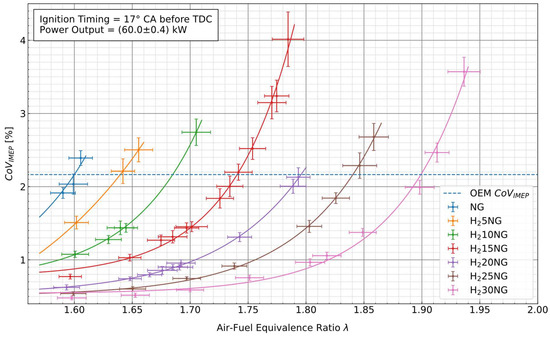
Figure 3.
CoV of IMEP versus air–fuel equivalence ratio for various hydrogen/natural gas mixtures.
More importantly, hydrogen enables stable combustion at significantly leaner mixtures. While pure natural gas operation becomes unstable at , allows stable operation up to , as defined by the criterion. The choice of as the primary stability metric reflects both its sensitivity to incomplete combustion and its practical relevance for engine control. Unlike misfire counts or pressure-based knock indicators, which are less suitable in lean-burn hydrogen-enriched systems, directly captures stochastic variation and partial burn phenomena. The optimization criterion in this study was thus defined such that any operation point considered “optimized” had to exhibit lower than the NG reference case.
By identifying the value at which each blend intersects the NG reference of 2.1%, we derive the following empirical model:
This relationship provides a practical limit beyond which hydrogen-induced improvements in combustion stability no longer compensate for increased dilution. It also defines the upper boundary for simultaneous , and optimization and is thus integral to the combined performance window discussed in Section 3.3.
3.2.3. Thermal Efficiency
Thermal efficiency in spark-ignition engines is influenced by combustion completeness and phasing. Hydrogen, due to its high flame speed and diffusivity, tends to shorten combustion duration and reduce cycle-by-cycle variability, both of which contribute to improved efficiency. Previous research confirms that mixtures can outperform pure NG in terms of thermal efficiency, particularly under lean conditions and with appropriate mixture preparation [4,10,11,12,17].
Our data support this general trend. At fixed , thermal efficiency increases with hydrogen content, reaching 35.8% for , an absolute gain of 2.3 percentage points over the NG reference (Figure 4). However, this gain plateaus beyond ~20 vol% hydrogen, indicating a saturation effect in the underlying combustion dynamics.
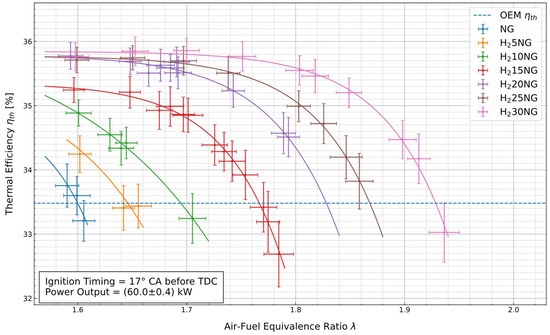
Figure 4.
Thermal efficiency versus air–fuel equivalence ratio for various hydrogen/natural gas mixtures.
As the mixture is leaned further, efficiency initially remains stable but begins to decline once the dilution effect outweighs the benefits of hydrogen-induced combustion acceleration. This leads to a hydrogen-specific threshold beyond which drops below the NG reference.
From the measured curves, we extract the value at which each blend maintains and fit the resulting values to obtain the following equation empirically:
This equation defines the efficiency-preserving boundary for each hydrogen blend and complements the constraints defined by emissions and combustion stability. The overlap of these three constraints defines the feasible range for fully optimized operation, which is the focus of the next section.
3.3. Simultaneous Optimization: Defining the Feasible Operating Window
The previous sections demonstrated that hydrogen enrichment influences each of the three key performance indicators, nitrogen oxide emissions, combustion stability, and thermal efficiency, in a distinct but predictable way. More importantly, it was shown that for each of these parameters, hydrogen enables operation at leaner values while maintaining or improving performance compared to conventional natural gas operation. The next step is to determine whether there exists a common range for each hydrogen blend in which all three KPIs are simultaneously improved, a condition not previously demonstrated in this form.
To this end, the empirical bounds derived in Equations (1) through (3) are plotted against hydrogen concentration in Figure 5. For each blend, this yields
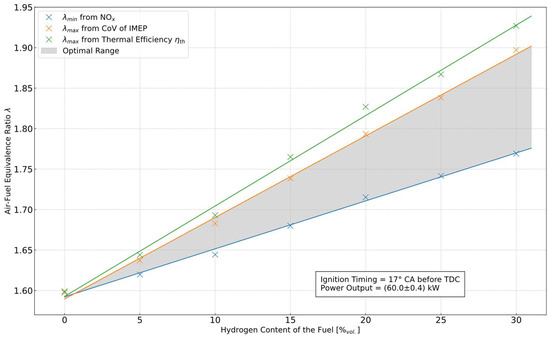
Figure 5.
Optimal air–fuel equivalence ratio as a function of hydrogen content of the fuel. The gray-shaded area represents the range where emissions, engine smoothness , and thermal efficiency criteria are all met.
- A lower bound defined by the minimum for reduction (Equation (1));
The intersection of these ranges defines the feasible optimization window in which
- 1.
- emissions are lower than those of the NG reference;
- 2.
- is improved or at least not worsened;
- 3.
- meets or exceeds the NG baseline.
As shown in Figure 5, this feasible window widens with increasing hydrogen content. For the blend, the simultaneous optimization range extends from to , yielding a bandwidth of . Within this region,
- emissions are reduced by up to 70%;
- Thermal efficiency is increased by up to 2.2 percentage points;
- Combustion stability is significantly improved, with reduced to values below 1%.
This is a central result of the study:
Hydrogen enables multi-objective optimization of lean-burn engine performance, requiring only a single engine parameter, , to be adjusted. Importantly, this can be achieved without modifying the ignition timing, hardware, or control strategy.
The significance of this finding lies in its applicability, the method presented requires only a -adaptive strategy. This lowers the technical barrier for retrofitting existing CHP units and makes hydrogen a viable performance booster for natural gas engines even in real-world decentralized energy systems.
Moreover, the quantitative framework established by Equations (1)–(3) offers a practical tool for engine calibration. It enables predictive control strategies that automatically adjust based on the actual hydrogen content of the fuel, ensuring that operation remains within the optimized regime.
The following section complements this result by analyzing in-cylinder pressure profiles. These confirm that hydrogen-related changes in combustion dynamics, especially the advance in peak pressure, can be effectively compensated through mixture leaning, closing the optimization loop.
3.4. Cylinder Pressure Analysis: Interpreting the Trade-Off Resolution
To support the results of Section 3.3 and to better understand the combustion dynamics associated with hydrogen enrichment, in-cylinder pressure measurements were evaluated for three key operating points:
- 1.
- Reference: Pure natural gas at ;
- 2.
- Efficiency-optimized: at ;
- 3.
- -optimized: at .
Figure 6 shows the corresponding pressure traces and pressure-rise rates (PRRs). Each curve provides insight into the interaction between hydrogen content, air–fuel ratio, combustion speed, and phasing.
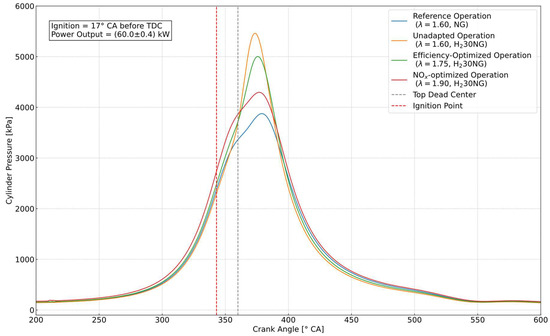
Figure 6.
Cylinder-pressure profiles of the reference operating point with natural gas and two different optimized operating points with a 70/30 vol./vol. natural gas–hydrogen mixture.
3.4.1. Reference Operation (, NG)
In the baseline case, peak pressure is reached at 19°CA after TDC, with a maximum value of 3876 kPa and a post-TDC PRR of approximately 32 kPa/°CA. This reflects a relatively late and moderate combustion process typical for lean-burn NG operation. The long combustion duration contributes to acceptable stability () but moderate efficiency and levels due to the OEM being near the lean limit.
3.4.2. Efficiency-Optimized Operation (, )
Adding 30 vol% hydrogen and adjusting by 0.15 leads to a substantial shift in the combustion phasing. Peak pressure increases to 5004 kPa and occurs at 16°CA after TDC, 3°CA earlier than in the NG case. The post-TDC PRR also increases sharply to 109 kPa/°CA. This value remains within expected limits for lean-burn turbocharged SI engines and does not suggest critical combustion.
This behavior indicates that hydrogen’s acceleration of flame propagation dominates over the deceleration caused by leaner mixtures. The resulting pressure trace is narrower and steeper, which explains the improved thermal efficiency () and reduced (0.7%). However, the emissions remain similar to the reference case. This is consistent with the concept that while combustion is shorter and more complete, the associated temperature rise promotes formation [10,15,17,18].
3.4.3. -Optimized Operation (, )
Further leaning to leads to a different combustion pattern. The peak pressure drops to 4301 kPa, mitigating hydrogen-induced pressure increases to just 11% above the natural gas baseline. The peak pressure occurs at 18°CA aTDC, and the PRR post-TDC returns to ≈32 kPa/°CA, almost identical to the NG reference.
This suggests that at , the faster combustion caused by hydrogen and the slower combustion due to dilution effectively cancel out, restoring a pressure curve that resembles the NG baseline in shape and timing. Nevertheless, the combustion is still more complete and more efficient (indicated by and ), while emissions drop drastically to 62 mg/Nm3 (−72% compared to NG).
This finding reinforces the central hypothesis: Hydrogen-induced shifts in combustion dynamics can be compensated through mixture leaning, enabling performance gains without mechanical overstress or emission penalties.
3.4.4. Implications
These pressure profiles validate that the optimization strategy proposed in this study does not rely on altering ignition timing or accepting high thermal loading. Instead, by targeting the intersection of the hydrogen content and lean-burn limit, it becomes possible to
- Retain OEM-compliant combustion phasing;
- Control pressure-rise rates within acceptable limits;
- Achieve smoother and more complete combustion.
The ability to maintain OEM pressure dynamics even at 30% hydrogen content is a strong argument in favor of the proposed -only control strategy. It confirms that performance optimization and mechanical robustness can coexist, making this approach both technically effective and practically viable.
4. Discussion
This study set out to determine whether hydrogen enrichment can simultaneously improve three critical performance metrics, -emissions, combustion stability, and thermal efficiency, in a lean-burn spark-ignition engine operated under constant conditions. The results presented in Section 3 provide clear evidence that this is not only possible, but can be achieved using a single control parameter: the air–fuel equivalence ratio .
4.1. Interpretation of Results in Context of Previous Studies
Previous work has shown that hydrogen enrichment offers individual benefits such as increased flame speed [10,11], reduced cycle-to-cycle variation [6], and improved thermal efficiency [10,11]. However, many of these studies also report trade-offs, most commonly, increased -emissions or combustion instability under lean conditions [12].
In contrast, this study shows that simultaneous improvement of all three KPIs is achievable within a practical control framework, relying solely on adjustment under fixed OEM parameters, an approach not systematically demonstrated in the prior literature. This represents a significant advancement over existing research, which tends to focus on isolated optimization goals or requires additional control complexity (e.g., variable ignition timing).
By systematically mapping the individual optimization thresholds and combining them into a unified operating window, this study provides a parameter-based evaluation framework that may support multi-criteria engine calibration in similar lean-burn configurations. A cylinder-pressure analysis supports the feasibility of this approach by confirming that combustion phasing and pressure-rise rates remain within OEM-compliant bounds under optimized adjustment.
4.2. Practical Implications
The results have direct implications for stationary CHP systems currently operating on natural gas. The demonstrated use of up to 30 vol% hydrogen without hardware modifications or ignition timing adjustment may reduce implementation complexity for existing CHP systems.
From a control perspective, the fact that alone governs the performance window simplifies implementation. A closed-loop controller that adjusts based on fuel composition could maintain the engine in its optimal state across a wide range of concentrations, without operator intervention or real-time combustion phasing diagnostics.
Furthermore, the observed reduction in implies smoother operation and potentially reduced mechanical wear. Combined with higher thermal efficiency and drastically reduced emissions, this suggests that hydrogen is not merely a clean fuel alternative, but a genuine performance enhancer for NG engines.
4.3. Limitations
Despite its promising results, this study also has limitations. The experiments were performed at constant engine speed, load, and ignition timing. While this simplification was necessary to isolate the effects of and hydrogen content, it does not capture transient behavior or load dynamics typical of real-world operation.
Although the results demonstrate a consistent reduction in relative to the natural gas baseline, it is important to emphasize that combustion stability, as defined in this study, serves as a comparative metric, not an absolute indicator of long-term mechanical integrity. The optimization strategy was deliberately designed such that hydrogen-enriched operation is considered beneficial only when falls below the value observed for pure natural gas.
However, even with improved cycle-to-cycle consistency, this does not inherently guarantee lower component wear or mechanical stress during extended operation. Factors such as localized heat fluxes, peak pressure gradients, and pressure-rise rates, though constrained in this study, may still differ significantly from NG operation and require further durability assessment.
Although pressure-rise rates remained below typical knock thresholds, the observed increase at optimized operating points (up to 109 kPa/°CA) could contribute to elevated local stress or accelerated wear, particularly in long-duration or variable-load applications. This aspect was not evaluated in the present study and represents a relevant direction for future durability analysis.
Additionally, only one engine type was tested. While the trends observed are likely generalizable to similar lean-burn engines, the empirical equations (Equations (1)–(3)) are engine-specific and would require recalibration for other configurations or gas qualities.
4.4. Future Research Directions
In addition to the -based optimization strategy presented in this work, ongoing investigations are exploring the role of ignition timing as a second control parameter. Preliminary data indicate that simultaneous optimization of the air–fuel ratio and spark timing can achieve comparable improvements in emissions, thermal efficiency, and combustion stability, while requiring less mixture dilution. This may enable operation at lower charge pressures, reducing mechanical stress and potentially enhancing long-term engine durability.
A comprehensive evaluation of this combined control approach, preferably including dynamic load behavior and transient conditions, will be addressed in a separate future publication.
5. Conclusions
This study shows that hydrogen enrichment in a lean-burn spark-ignition CHP engine can simultaneously reduce emissions, improve combustion stability, and enhance thermal efficiency, provided that the air–fuel equivalence ratio () is adjusted accordingly.
Experiments conducted on a commercially available six-cylinder engine with blends up to 30% hydrogen by volume identified an operational range (e.g., for ) where
- emissions were reduced by up to 70%;
- Thermal efficiency increased by up to 2.2 percentage points;
- Cycle-to-cycle variability () was reduced by more than 60%.
A cylinder-pressure analysis confirmed that hydrogen-induced changes in combustion dynamics can be almost offset by mixture leaning alone, maintaining OEM-like pressure-rise rates and phasing.
Building on earlier research that explored partial improvements, the present work contributes a unified and empirically validated control strategy that enables simultaneous optimization across all three KPIs, using only adjustment and without altering ignition timing or engine hardware. The findings suggest that adaptive control may serve as a low-complexity and practical strategy to enhance performance and reduce emissions in existing stationary gas engines.
Although the experiments were limited to a steady-state operating point at 60 kW (≈55% of rated power), the observed trends provide a robust starting point for further studies on load-dependent behavior and control strategies in hydrogen-enriched CHP engines.
Author Contributions
Conceptualization, J.F.; methodology, J.F.; software, J.F.; validation, J.F.; formal analysis, J.F.; investigation, J.F.; resources, J.F. and J.K.;data curation, J.F.; writing—original draft preparation, J.F.; writing—review and editing, J.N.; visualization, J.F.; project administration, J.F. and J.K. All authors have read and agreed to the published version of the manuscript.
Funding
This research was funded by the Federal Ministry for Economic Affairs and Climate Action (BMWK) on the basis of a decision by the German Bundestag, grant number KK5215401JO0.
Data Availability Statement
The raw data supporting the conclusions of this article will be made available by the authors on request.
Acknowledgments
The authors gratefully acknowledge the technical support provided by Dieter Jarosch, as well as the contributions of Murad Al-Towaie and Eliza Khadzhieva, who assisted in data acquisition.
Conflicts of Interest
The authors declare no conflicts of interest.
Abbreviations
The following abbreviations are used in this manuscript:
| CHP | Combined heat and power |
| Coefficient of variation of indicated mean effective pressure | |
| Hydrogen | |
| Fuel blend consisting of x vol% and 100-x vol% NG | |
| KPI | Key performance indicator |
| NG | Natural gas |
| Nitrogen oxides | |
| OEM | Original equipment manufacturer |
| Thermal efficiency | |
| Air–fuel equivalence ratio |
References
- Melaina, M.; Antonia, O.; Penev, M. Blending Hydrogen Into Natural Gas Pipeline Networks: A Review of Key Issues; NREL: Golden, CO, USA, 2013. [Google Scholar] [CrossRef]
- Yue, M.; Lambert, H.; Pahon, E.; Roche, R.; Jemei, S.; Hissel, D. Hydrogen energy systems: A critical review of technologies, applications, trends and challenges. Renew. Sustain. Energy Rev. 2021, 146, 111180. [Google Scholar] [CrossRef]
- Verhelst, S.; Wallner, T. Hydrogen-fueled internal combustion engines. Prog. Energy Combust. Sci. 2009, 35, 490–527. [Google Scholar] [CrossRef]
- Ma, F.; Wang, Y.; Liu, H.; Li, Y.; Wang, J.; Zhao, S. Experimental study on thermal efficiency and emission characteristics of a lean burn hydrogen enriched natural gas engine. Int. J. Hydrogen Energy 2007, 32, 5067–5075. [Google Scholar] [CrossRef]
- Ma, F.; Wang, Y. Study on the extension of lean operation limit through hydrogen enrichment in a natural gas spark-ignition engine. Int. J. Hydrogen Energy 2008, 33, 1416–1424. [Google Scholar] [CrossRef]
- Ma, F.; Wang, Y.; Liu, H.; Li, Y.; Wang, J.; Ding, S. Effects of hydrogen addition on cycle-by-cycle variations in a lean burn natural gas spark-ignition engine. Int. J. Hydrogen Energy 2008, 33, 823–831. [Google Scholar] [CrossRef]
- Algayyim, S.J.M.; Saleh, K.; Wandel, A.P.; Fattah, I.M.R.; Yusaf, T.; Alrazen, H.A. Influence of natural gas and hydrogen properties on internal combustion engine performance, combustion, and emissions: A review. Fuel 2024, 362, 130844. [Google Scholar] [CrossRef]
- Lo Basso, G.; Pastore, L.M.; Sgaramella, A.; Mojtahed, A.; de Santoli, L. Recent progresses in H2NG blends use downstream Power-to-Gas policies application: An overview over the last decade. Int. J. Hydrogen Energy 2024, 51, 424–453. [Google Scholar] [CrossRef]
- Yu, S.; Fan, Y.; Shi, Z.; Li, J.; Zhao, X.; Zhang, T.; Chang, Z. Hydrogen-based combined heat and power systems: A review of technologies and challenges. Int. J. Hydrogen Energy 2023, 48, 34906–34929. [Google Scholar] [CrossRef]
- Mehra, R.K.; Duan, H.; Juknelevicius, R.; Ma, F.; Li, J. Progress in hydrogen enriched compressed natural gas (HCNG) internal combustion engines—A comprehensive review. Renew. Sustain. Energy Rev. 2017, 80, 1458–1498. [Google Scholar] [CrossRef]
- Yan, F.; Xu, L.; Wang, Y. Application of hydrogen enriched natural gas in spark ignition IC engines: From fundamental fuel properties to engine performances and emissions. Renew. Sustain. Energy Rev. 2018, 82, 1457–1488. [Google Scholar] [CrossRef]
- Park, C.; Kim, C.; Choi, Y.; Won, S.; Moriyoshi, Y. The influences of hydrogen on the performance and emission characteristics of a heavy duty natural gas engine. Int. J. Hydrogen Energy 2011, 36, 3739–3745. [Google Scholar] [CrossRef]
- Kosmadakis, G.; Rakopoulos, D.; Rakopoulos, C. Investigation of nitric oxide emission mechanisms in a SI engine fueled with methane/hydrogen blends using a research CFD code. Int. J. Hydrogen Energy 2015, 40, 15088–15104. [Google Scholar] [CrossRef]
- Korb, B.; Kawauchi, S.; Wachtmeister, G. Influence of hydrogen addition on the operating range, emissions and efficiency in lean burn natural gas engines at high specific loads. Fuel 2016, 164, 410–418. [Google Scholar] [CrossRef]
- Zheng, S.; Zhang, X.; Xu, J.; Jin, B. Effects of initial pressure and hydrogen concentration on laminar combustion characteristics of diluted natural gas-hydrogen-air mixture. Int. J. Hydrogen Energy 2012, 37, 12852–12859. [Google Scholar] [CrossRef]
- Mariani, A.; Prati, M.V.; Unich, A.; Morrone, B. Combustion analysis of a spark ignition i. c. engine fuelled alternatively with natural gas and hydrogen-natural gas blends. Int. J. Hydrogen Energy 2013, 38, 1616–1623. [Google Scholar] [CrossRef]
- Huang, Z.; Liu, B.; Zeng, K.; Huang, Y.; Jiang, D.; Wang, X.; Miao, H. Combustion Characteristics and Heat Release Analysis of a Spark-Ignited Engine Fueled with Natural Gas-Hydrogen Blends. Energy Fuels 2007, 21, 2594–2599. [Google Scholar] [CrossRef]
- Ma, F.; Wang, Y.; Wang, J.; Ding, S.; Wang, Y.; Zhao, S. Effects of Combustion Phasing, Combustion Duration, and Their Cyclic Variations on Spark-Ignition (SI) Engine Efficiency. Energy Fuels 2008, 22, 3022–3028. [Google Scholar] [CrossRef]
Disclaimer/Publisher’s Note: The statements, opinions and data contained in all publications are solely those of the individual author(s) and contributor(s) and not of MDPI and/or the editor(s). MDPI and/or the editor(s) disclaim responsibility for any injury to people or property resulting from any ideas, methods, instructions or products referred to in the content. |
© 2025 by the authors. Licensee MDPI, Basel, Switzerland. This article is an open access article distributed under the terms and conditions of the Creative Commons Attribution (CC BY) license (https://creativecommons.org/licenses/by/4.0/).